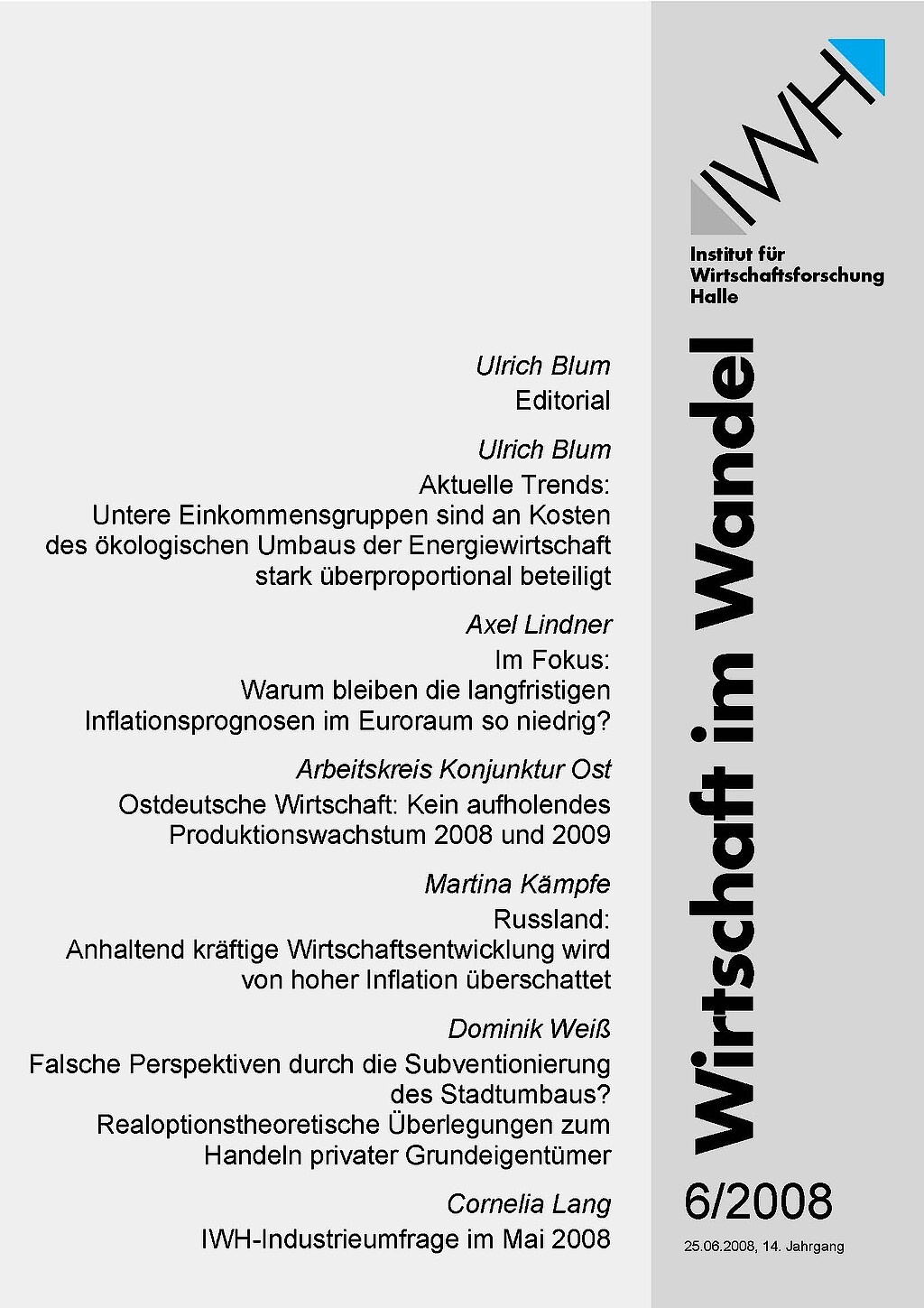Eastern German Economy: No Catching-up in 2008 and 2009
Arbeitskreis Konjunktur Ostdeutschland
in: Wirtschaft im Wandel,
No. 6,
2008
Abstract
Die Entwicklung der gesamtwirtschaftlichen Produktion in den Neuen Bundesländern wird derzeit von zwei gegenläufigen Tendenzen geprägt. Der Unternehmenssektor steigert seine Wertschöpfung, und dies seit zwölf Jahren überdurchschnittlich, der staatliche Sektor baut weiter ab. Auch zwischen den Unternehmen verläuft die Entwicklung nicht einheitlich. Während die auf Ostdeutschland ausgerichteten Unternehmen kaum Wachstumsimpulse empfangen, nehmen die anderen die Impulse von den wachsenden externen Märkten in den Alten Bundesländern und im Ausland auf. Diese Gefälle dämpfen den Anstieg von Produktion und Beschäftigung und führen letztlich zum Wachstumsrückstand gegenüber den Alten Bundesländern. Er wird auch nicht wie in den vergangenen Jahren durch das Einbeziehen der divergierenden Bevölkerungsdynamik zwischen den Neuen und den Alten Bundesländern aufgewogen. Der Abstand in der Pro-Kopf-Produktion verringert sich kaum.
Die Nachfrage auf den externen Märkten hat nicht nur die Ausfuhren über die Grenzen des Wirtschaftsgebiets hinaus angeregt, sondern auch die Investitionstätigkeit der Firmen vor Ort wieder in Schwung gebracht. Selbst in bauliche Anlagen wurde in den vergangenen beiden Jahren verstärkt investiert. Allein die privaten Haushalte haben ihre Konsumausgaben weiter eingeschränkt. Selbst das von Sondereffekten im Vorfeld der Anhebung der Mehrwertsteuer geprägte Jahr 2006 hat die Abwärtstendenz nicht unterbrechen können. Die schwache Kaufkraft und die rückläufige Zahl an Konsumenten bestimmen die Grundtendenz. Treibende Kraft der wirtschaftlichen Entwicklung war, ist und bleibt auf absehbare Zeit das Verarbeitende Gewerbe, auch wenn sich seine Wachstumsdynamik im Sog der geschwächten Weltkonjunktur zunächst verlangsamt. Es profitiert von der Expansion der Nachfrage auf den externen Märkten und ist aufgrund der regionalen Ausrichtung der Lieferungen in das Ausland weniger anfällig gegenüber den derzeitigen Immobilienkrisen in den USA und einigen Ländern Westeuropas sowie den Turbulenzen an den internationalen Finanzmärkten. Auch hat sich der preisliche Wettbewerbsvorteil gegenüber den Alten Bundesländern trotz verstärkt gestiegener Arbeitskosten im Jahr 2007 nochmals verbessert, und der Nachteil gegenüber industriellen Anbietern aus Mittelosteuropa ist etwas geringer geworden. Die überwiegende Zahl dieser Länder hat bei den Löhnen stärker als bei der Produktivität aufgeholt. Die kräftige industrielle Expansion strahlt über die Produktionsverflechtungen auf das Verkehrsgewerbe und die wirtschaftsnahen Dienstleister aus. Dagegen bleiben der Handel und die personennahen Dienstleister aufgrund der sinkenden Verbraucherzahlen und deren schwacher Kaufkraft zurück. Insgesamt wird das Bruttoinlandsprodukt in diesem Jahr um 1,7% und damit erneut langsamer als in den Alten Bundesländern steigen.
Die Lage am Arbeitsmarkt verbessert sich dank der Expansion von Nachfrage und Pro-duktion sowie der steigenden Wettbewerbsfähigkeit der Unternehmen gegenüber auswärtigen Anbietern nochmals. Die registrierte Arbeitslosigkeit unterschreitet in diesem Jahr die Eine-Million-Marke. Unternehmensdienstleister und Industrieunternehmen stellen zusätzliches Personal ein. Gemessen an der Beschäftigungsdichte setzt sich die Re-Industrialisierung fort. Zur Unterstützung der Aufwärtsbewegung ist den Instrumenten zur Förderung von Investitionen und Innovationen höchste Priorität einzuräumen und die Vergabe der Fördermittel effizienter zu gestalten. Mit dem Produktionsanstieg wird sich das Defizit in der regionalen Leistungsbilanz der Neuen Bundesländer weiter verringern. Die Absorption von Gütern und Dienstleistungen übertrifft nach Schätzung des IWH das Niveau der gesamtwirtschaftlichen Produktion nur noch um etwa 10%, nach einem Drittel im Jahr 2000.
read publication





